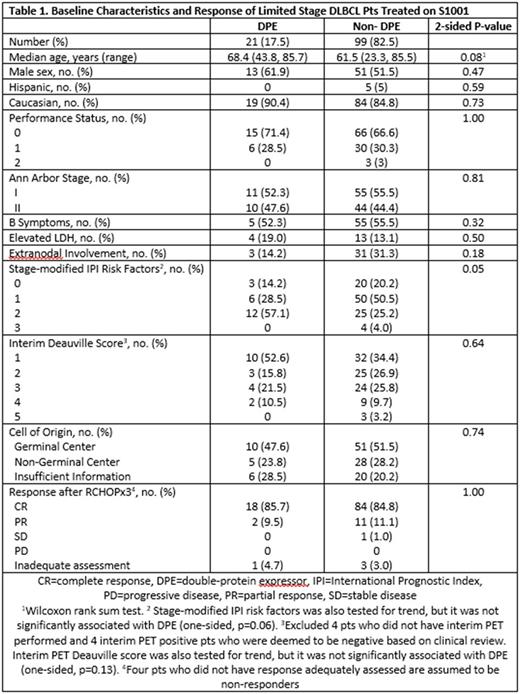Abstract
Introduction
Concurrent over-expression of MYC (≥40%) and BCL2 (≥50%) by immunohistochemistry [IHC; termed double-protein expression (DPE)] in tumor samples is seen in 20-30% of patients (pts) with advanced stage DLBCL and has been associated with poor clinical outcomes, including lower complete response rates (CRRs) with standard RCHOP (rituximab, cyclophosphamide, doxorubicin, vincristine and prednisone) therapy (Green, 2012). No data have been published to describe the clinical or molecular characteristics or treatment outcomes of pts with limited stage (Ann Arbor Stage I-II) DLBCL who have DPE. Here, we describe a subset of these pts treated on SWOG S1001.
Methods
From 2011-2016, 159 pts with non-bulky limited stage DLBCL were accrued to S1001 and received standard therapy with RCHOP for 3 cycles. PET scan was performed after RCHOPx3 and if negative (Deauville Score ≤3), they received 1 additional cycle of RCHOP. If PET scans were positive (Deauville ≥4), they received involved-field radiotherapy and ibritumomab-tiuxetan consolidation. Confirmation of diagnosis, MYC and BCL2 staining were performed centrally. Cases with ≥40% MYC and ≥50% BCL2 expression were considered to have DPE. Cell-of-origin (COO) was determined based on the listed immunophenotype in the original pathology reports according to the Hans criteria. Clinical response was assessed according to the revised Cheson 2007 criteria. Following central review, 34 of the 159 pts were determined pathologically or clinically ineligible for analysis (20 = incorrect histology; 12 = insufficient pathologic samples; 1 = upstaged by PET, 1 = indolent lymphoma in bone marrow sample). An additional 5 pts were excluded due to indeterminate IHC staining, leaving 120 eligible/evaluable pts for inclusion in this subset analysis. Fisher's exact test was used to compare the distribution of the clinical characteristics, COO, CRR following RCHOP between the DPE and Non-DPE groups at two-sided alpha of .05. Pts who had early discontinuation of RCHOP that could not undergo adequate response determination are assumed to be non-responders for the purpose of response rate estimation.
Results
Median follow-up of pts treated on S1001 is currently 29 months (range = 11-61 months). Of 120 eligible pts, 21 (17.5%) had DPE verusus 99 without DPE (Non-DPE). Clinical characteristics between the DPE and Non-DPE groups were not statistically different (Table 1). The DPE group had a higher median age (68.4 years) compared with the Non-DPE group (61.5 years; p = 0.08). The DPE group had higher stage-modified International Prognostic Index (IPI) ≥ 2 (57.1%) compared with the Non-DPE group (29.2%; p = 0.0504). There was no association between DPE status and COO (Germinal Center = 47.6% of DPE versus 51.5% of Non-DPE; p = 0.74). CR rates following RCHOP were similar between the DPE and Non-DPE groups (85.7% versus 84.8%; p = 1.00).
Conclusions
Patients with limited stage DLBCL treated on S1001 had a similar proportion of DPE as seen in previous publications in advanced stage DLBCL. Although pts with DPE tended to have higher age and stage-modified IPI, there were no statistically significant differences in baseline clinical characteristics compared to those in the Non-DPE group. Importantly, the DPE group had same rate of CR compared with the Non-DPE group, contrasting with the poor CRR seen in advanced stage DLBCL pts with DPE. These preliminary data suggest that limited stage DLBCL pts with DPE may not have the same poor clinical outcomes as advanced stage DLBCL pts with DPE when treated with standard RCHOP therapy. These data support the efficacy and use of RCHOP in the limited stage DPE DLBCL pts and suggest that more aggressive therapies may not be needed in this setting. These data provide further evidence of the unique natural history of limited stage DLBCL and the importance of continuing to pursue dedicated prospective trials for this population. Extended follow-up of the S1001 pts for progression-free and overall survival data is needed to provide further data regarding clinical outcomes of these limited stage DLBCL pts with DPE.
Support: NIH/NCI grants CA180888, CA180819, CA180820, CA180821; and Spectrum Pharmaceuticals, Inc.
Persky: Genentech: Consultancy; MorphoSys: Other: Independent Data Monitoring Committee member ; Verastem: Consultancy; Spectrum Pharmaceuticals: Research Funding. Park: Teva: Consultancy, Other: research support; Gilead: Consultancy; Cornerstone: Consultancy, Honoraria; Seattle Genetics: Other: research support; Takeda: Other: research support. Bartlett: Gilead: Consultancy, Membership on an entity's Board of Directors or advisory committees; Novartis: Research Funding; ImaginAB: Research Funding; Astra Zeneca: Research Funding; Millenium: Research Funding; Pharmacyclics: Research Funding; Janssen: Research Funding; Affimed: Research Funding; Forty Seven: Research Funding; Immune Design: Research Funding; Bristol-Meyers Squibb: Research Funding; Merck & Co: Research Funding; KITE: Consultancy, Membership on an entity's Board of Directors or advisory committees, Research Funding; Pfizer: Consultancy, Membership on an entity's Board of Directors or advisory committees, Research Funding; Genentech: Research Funding; Seattle Genetics: Consultancy, Membership on an entity's Board of Directors or advisory committees, Research Funding; Celgene: Research Funding. Swinnen: Pharmacyclics: Consultancy; Genentech: Consultancy. Casulo: Celgene: Research Funding; Infinity: Consultancy; Gilead: Honoraria, Other: travel support. Leonard: Celgene: Consultancy, Research Funding; Roche: Consultancy. Kahl: Gilead: Consultancy; ADC Therapeutics: Research Funding; Celgene: Consultancy; Seattle Genetics: Consultancy; Genentech: Consultancy. Fisher: Bayer: Consultancy; Astra Zeneca: Consultancy; Genentech: Consultancy; Celegene: Consultancy; Sandoz: Consultancy; Seattle Genetics: Consultancy; Kite: Consultancy; Pharmacyclics: Consultancy; F.Hoffmann-LaRoche: Consultancy. Friedberg: Bayer HealthCare Pharmaceuticals.: Other: Data and Safety Monitoring Board: Bayer HealthCare Pharmaceuticals.
Author notes
Asterisk with author names denotes non-ASH members.


This feature is available to Subscribers Only
Sign In or Create an Account Close Modal